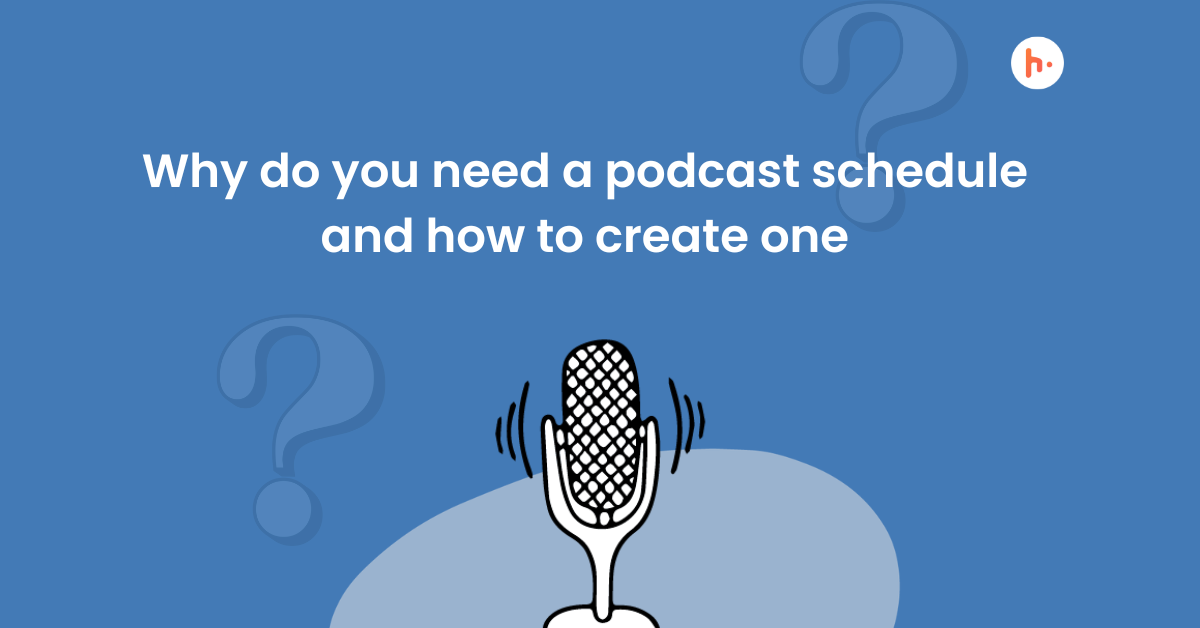In any job, most of the work is done if you show up regularly and on time. It’s the same with podcasting. Before you launch your podcast, it is important for you to have a strategy in place, a plan that will ensure that you show up with a new episode on time. But how do you create this strategy? How do you know when to publish an episode and how often? How will you keep on being consistent even when it becomes tedious in the long run?
If you are a new podcaster, it’s imperative that you figure out these questions before you launch your podcast because that’s the only time when you can plan at leisure. Once your podcast goes live, it’ll be time to implement those plans.
In this blog, we’ll discuss the best day and time to release your podcast episodes and how to create a podcast schedule.
Why you need a podcast schedule
Consistency is the key and will take you a long way, no matter how overrated it sounds. In the chaos, you’ll need something to anchor you, and that something will be a well-planned podcast schedule. Here’s how a podcast schedule can help you:
- It’ll streamline your production and maximize your efficiency. When you have a plan, it puts everything into perspective. With a schedule, you will see all your tasks (like ideation, production, and editing) and align them so that you can meet your deadline.
- If you start your podcast with three episodes instead of planning for the next few months, you’ll walk yourself to the podfade tunnel. That’s how most podcasts meet their early demise without ever reaching their full potential. With a podcast schedule, you can definitely avoid that sordid fate.
- A schedule will help you create a vision for your podcast. It’s easy to get sidetracked when you actually start creating content, but your schedule will help you avoid going off the rails and stick to that big vision.
Now that you know why you can’t do without a podcast schedule let’s discuss some common questions when it comes to releasing a podcast episode.
Best day and time to release an episode
According to the Megaphone research, the best days to release new podcast episodes are Wednesday, Tuesday, and Thursday (respectively) between 2 AM and 5 AM, with 5 AM gaining the maximum downloads. This is when most creators publish new episodes.
Since each podcast has a unique set of audiences with unique listening behavior, it is recommended that you post new episodes at 5 AM IST on Tuesdays, Wednesdays, or Thursdays. Besides these timings, there are a few more things you can be mindful of:
Avoid the midnight drought
According to Megaphone, shows that upload new episodes during midnight gain lower downloads than shows that post from 2 AM to 6 AM.
Why? Suppose you publish your episode around 12 AM or 1 AM. It might be the first one to get to your listeners’ feed, but there are also high chances that it will get buried under other shows that post in the early morning hours. So, it’s better if you avoid the midnight hours.
Early morning magic
Unlike midnight hours, the morning hours come with a lot of traffic. Posting your episode first thing in the morning will increase the chances of your episode appearing at the top of your listeners’ feed in top directories like Apple Podcasts, Spotify, Google Podcasts, and Spotify. This will also give the directories enough time to create shareable links that you can use in your marketing and promotions.
Consider the buffer time
Podcast directories run periodical refreshes every 24 hours, where they pull content from all the podcast RSS feeds in their system. This creates a lag between the time you upload an episode and the time it becomes available on streaming apps. To avoid this, you can upload your episodes at 5 AM in the morning so that there’s enough buffer time for the streaming platforms to refresh the feeds. That way, your content will be live by 8 AM, when listeners are ready to tune in for some early morning audio content.
Be mindful of various timezones
If you have a local listenership, you don’t have to worry about the time zones. However, if most of your listeners are tuning into your podcast from various parts of the world, then consider studying those time zones to further optimize when you release new episodes.
See what works for you
Every podcast is unique. Just because these suggestions work for most of the podcast shows doesn’t mean they’ll work for you too. That’s why we recommend you to see what works best for you. Once you have a steady listenership, track your analytics and see when your content performs well and when it does not.
Maybe your listeners tune into your podcast in the late hours of the night or maybe they look for your podcast bring in the morning when they are off to work. This distinction majorly depends on your podcast theme. No one would start their day with horror and gruesome true crime, and no one will meditate and exercise at midnight. The point is that as time goes on, you’ll have to discover what is best for your audience & adapt accordingly.
How often should you release a podcast?
The sweet spot for all creators is one episode each week. But you don’t necessarily have to follow others.
When you are planning the frequency of your podcast episodes, consider these things:
Are you a professional podcaster?
Professional creators are most often the ones who consistently upload content and stick to their schedules. Just like TV shows, this helps them build a habit for their listeners, where they can expect a new episode on the usual publishing days.
If you see yourself as a professional podcaster in the future, then you need to consider your podcast topic. If it’s a news & trends podcast, then you’ll have to stick to a daily schedule. If your content falls under storytelling/fiction or interview formats, then weekly publishing is the way to go! You can also publish biweekly, monthly, or semimonthly, but these frequencies are less popular and successful.
Are you a Brand/Network?
A lot of brands and major media networks drop a full show or a season at once. It’s quite similar to how some shows are published on Netflix. This kind of style suits narrative and fiction podcasts that are evergreen and can be tuned into irrespective of the time and season. Big media houses take this approach because they can easily batch produce the content and publish it in a go. If you are a brand or if you think you can plan and produce your season at once, then this style might work for you.
Are you a hobbyist?
Hobbyists don’t necessarily stick to a schedule They enjoy podcasting as a hobby, something they can do in their spare time. This means that they are not after the metrics or expanding their podcasting bandwidth. If you are also podcasting for similar reasons, then you don’t need a schedule. We usually suggest against this because it can lead to podfade or mess with your consistency. However, in this particular case where you are looking at podcasting just as a hobby, not having a schedule might be good for you as it’ll take off the pressure of coming up with content and posting regularly.
How to create a podcast schedule
To create a podcast schedule that works for you, you’ll have to see the bigger picture. This is when you decide what kind of content you’ll be creating and what is your end goal so that you can align your actions to create that big picture. Let’s see how you can do so in three steps:
Create your editorial calendar
An editorial calendar is where you list what content you will be creating and publishing in the coming months. You might have a bunch of ideas that you want to work on. Once you put these topics in the calendar, you’d be able to streamline your ideation process and fledge out the details that will come in handy during production.
We suggest you use a digital calendar or an app so that you can store all the details in one place to keep it organized, especially if you have a guest podcast or a show that requires a lot of research.
An editorial calendar also reduces the chances of you running out of ideas. Since you’ll be planning well ahead of time, you won’t have to worry about coming up with a topic every week. If you stay true to your schedule, you’ll continue to remain ahead of time.
Not only will a calendar simplify your content, but it will also put production into perspective. You can batch record a few episodes to stay consistent from the get-go. You can also sort out details like titles, descriptions, publishing day and time, frequency, and more.
All being said, you don’t have to swear by the schedule. You can change it from time to time to keep things fresh or to even take opportunities that you could not predict at the time you were planning your calendar, like landing a dream guest interview.
Define all your tasks
As easy as podcasting is, it comes with a lot of work. While creating an episode, you’ll be ideating, scripting, recording, editing, marketing, and more, and this cycle will repeat in every episode creation. In your editorial calendar, you can outline these actions – nothing detailed but highlights of tasks so that you are aware of your workload. Different podcasts might have a different process, but here’s a basic podcast production workflow below that you can refer to:
- Topic ideation and research
- Draft the podcast script
- Record episode
- Edit episode
- Create episode artwork
- Publish episode
- Plan & schedule promotional content for social media, email, website, etc.
- Track episode analytics
Create a standard workflow
Now that all your tasks are defined, you need to bring them all together and align them with your editorial calendar. This process is basically your podcast production workflow. This workflow will detail when each phase needs to be completed, who will handle them, and under what timeframe.
This is more required for podcasters who work with a team. If you are a one-man-army, then you can just map out all the tasks and delegate a time frame to each of them to keep yourself on track. If you are working with a team, then creating a workflow will help you and your team to know who’s working on what and when they have to meet the deadlines.
Conclusion
To stay on top of your podcast game and build a loyal audience, you need to deliver the best quality content consistently. But, if your podcast falls behind schedule, it could be hard to keep a flow which might lead to podfade. To avoid this and meets your listeners’ expectations, it is imperative that you create a podcasting workflow and stick to it.





